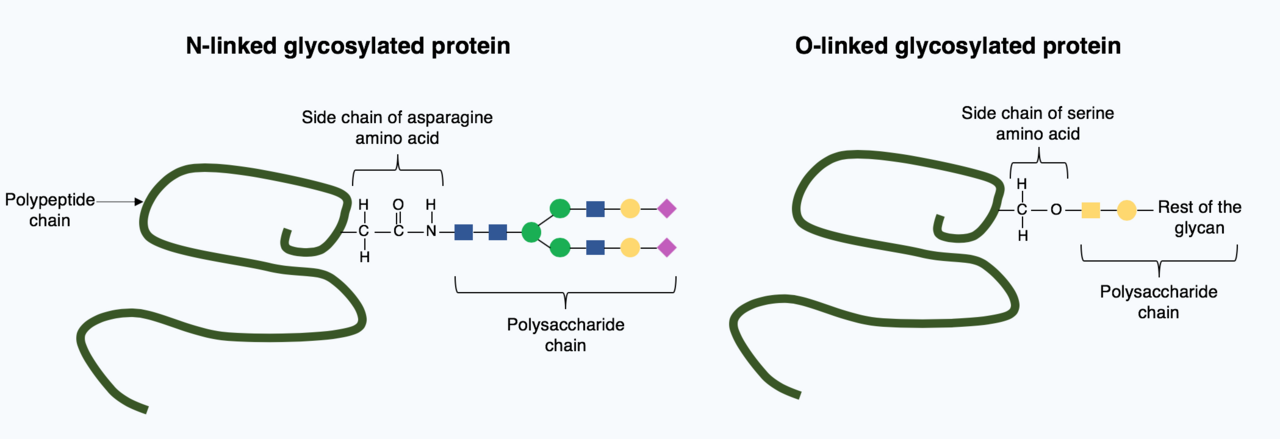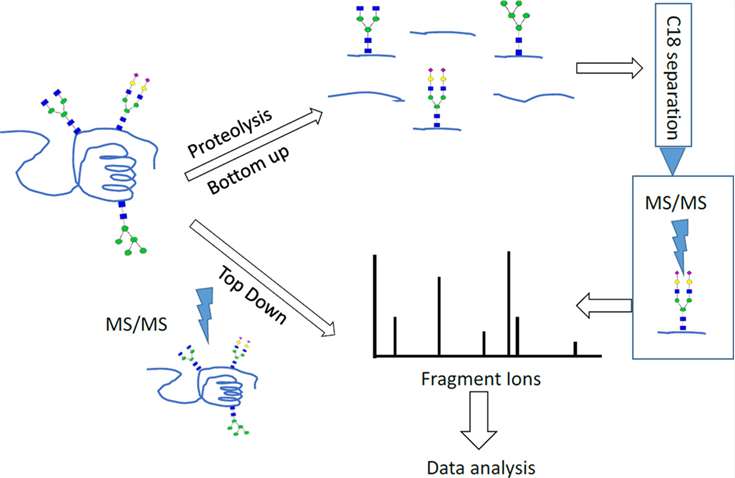Glycoprotein Amino Acid Sequence Analysis Service
Glycoproteins are essential players in numerous biological processes, including cell recognition, signal transduction, and immune regulation. What makes them structurally unique is the covalent linkage between the protein backbone and oligosaccharide chains. The position and pattern of glycosylation directly influence a glycoprotein’s stability, solubility, three-dimensional conformation, and interactions with other biomolecules.
At the heart of every glycoprotein lies its amino acid sequence, which defines both its functional core and the potential sites for glycan attachment. Accurate determination of this primary sequence, particularly in highly glycosylated proteins, is crucial for basic research, biopharmaceutical development, and regulatory consistency assessments.

Source: Wikipedia
Figure 1. Illustration of N-linked and O-linked Glycosylation Sites on Glycoproteins
MtoZ Biolabs offers dedicated Glycoprotein Amino Acid Sequence Analysis Service focused on reconstructing the exact backbone sequence of glycoproteins. Leveraging high-resolution mass spectrometry and multi-enzyme digestion strategies, our Glycoprotein Amino Acid Sequence Analysis Service supports applications ranging from unknown protein identification to antibody sequence validation and protein engineering. For clients seeking full structural insights, this service can be seamlessly combined with our N-glycosylation and O-glycosylation site mapping and glycan structure analysis, enabling a comprehensive, single-source solution for glycoprotein characterization.
Analysis Workflow
Our Glycoprotein Amino Acid Sequence Analysis Service is specifically tailored to the complexities of glycoproteins. From sample preparation to data interpretation, each step is designed to ensure high accuracy and complete sequence coverage.
1. Sample Preparation and Digestion Strategy Design
Glycoproteins undergo desalting, denaturation, and reduction-alkylation. Based on the protein’s physicochemical properties, we design an optimized multi-enzyme digestion strategy using enzymes such as trypsin, Glu-C, and chymotrypsin to maximize peptide coverage.
2. Optional Deglycosylation or Glycopeptide Retention
Depending on your goals, we can enzymatically remove N- or O-glycans using PNGase F or O-Glycosidase to improve ionization efficiency. Alternatively, glycopeptides can be retained for integrative sequence and glycosylation analysis.
3. LC Separation and High-Resolution Mass Spectrometry
Peptides are separated using nano-liquid chromatography and analyzed on Orbitrap Fusion Lumos or Q Exactive HF systems. Data are acquired under Data-Dependent Acquisition or Parallel Reaction Monitoring modes to ensure high precision and reproducibility.
4. Data Processing and Sequence Reconstruction
Identified spectra are processed using Proteome Discoverer, Byonic, or other leading tools. For unknown proteins or non-model species, we apply de novo sequencing algorithms to reconstruct the full-length amino acid sequence without relying on reference databases.
5. Optional Validation of Key Findings
Upon request, we can perform Edman degradation to validate N-terminal sequences or use Western blotting to confirm the expression of the glycoprotein of interest.

Kailemia, M. J. et al. Anal Bioanal Chem. 2017.
Figure 2. Glycoprotein Sequence Analysis Strategies: Bottom-up and Top-down Approaches
Why Choose MtoZ Biolabs?
✔ Advanced Analysis Platform: We utilize Orbitrap-based instruments to achieve ultra-high resolution and confident identification, even in complex glycoprotein samples.
✔ Strong Adaptability to Complex Matrices: Our workflow supports a wide range of sample types including recombinant proteins, therapeutic biologics, cell lysates, and tissue homogenates.
✔ De Novo Capability for Unknown Proteins: Even without reference sequences, we can reconstruct novel protein backbones using deep sequencing and intelligent algorithm assembly.
✔ Integrated Glycosylation Analysis: We offer optional annotation of glycosylation sites to complement backbone sequencing, supporting a multidimensional understanding of glycoprotein structure and function.
✔ One-Time-Charge: Our pricing is transparent, no hidden fees or additional costs.
Sample Submission Suggestions
Our Glycoprotein Amino Acid Sequence Analysis Service is compatible with a wide range of sample types, such as purified proteins, recombinant products, cell lysates, and tissue homogenates. To ensure high data quality, samples should be free from detergents, salts, cryoprotectants, or other interfering substances. Please store samples frozen and ship them with dry ice.
Our technical team provides detailed guidance on sample preparation, storage, and transport. We also offer one-on-one pre-project consultations to help clients align experimental designs with analytical goals.
Applications
· Recombinant Glycoprotein Structural Verification: Confirm the sequence fidelity and expression stability of glycoproteins during drug development.
· Antibody and Vaccine Protein Sequencing: Decode variable regions, reconstruct fusion protein structures, and support epitope mapping or CDR validation.
· Structural Analysis of Native Glycoproteins: Identify the full-length sequence of glycoproteins isolated from complex biological sources.
· Functional Impact of Post-Translational Modifications: Correlate glycosylation site mapping with protein function, aiding mechanistic insights.
· Regulatory Submission Support: Generate high-confidence sequence data to meet documentation requirements for biologics registration and quality control.
If you are working on antibody engineering, vaccine development, therapeutic glycoprotein characterization, or foundational proteomics, our Glycoprotein Amino Acid Sequence Analysis Service offers unmatched precision and flexibility. We not only provide comprehensive sequence coverage but can also incorporate glycosylation and PTM insights to support your research at every level.
Contact MtoZ Biolabs to request a free project evaluation and receive a customized analytical plan. Our expert team is ready to help you unlock deeper insights into glycoprotein structure and function.
What Could be Included in the Report?
1. Comprehensive Experimental Details
2. Materials, Instruments, and Methods
3. Sequence Identification Report
4. Data Analysis, Preprocessing, and Estimation
5. Optional Bioinformatics Insights
6. Raw Data Files
FAQ
Q1: Can you sequence a glycoprotein that has no known reference sequence?
Yes, we can. Using de novo sequencing algorithms, we can reconstruct the full amino acid sequence based on high-coverage tandem mass spectra. This is ideal for novel proteins, new expression constructs, or species without established sequence databases.
Q2: Is this service suitable for antibody-based therapeutics?
Absolutely. We support detailed sequencing of monoclonal antibodies, fusion proteins, and vaccine components. Our workflow includes N- and C-terminal sequencing, CDR region identification, and glycosylation structure validation to support quality control and sequence consistency requirements in biopharmaceutical development.
Related Services
How to order?







